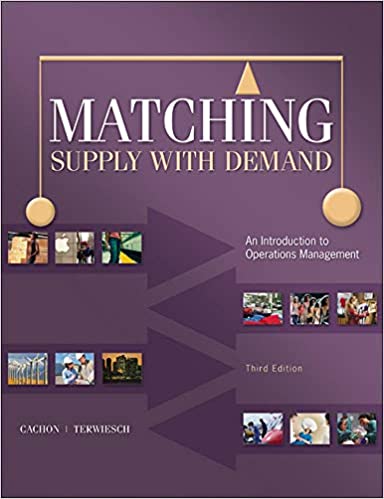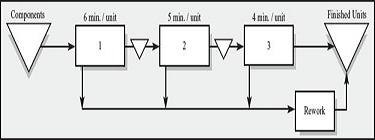
Matching Supply with Demand 3rd Edition by Gerard Cachon,Christian Terwiesch
Edition 3ISBN: 978-0073525204
Matching Supply with Demand 3rd Edition by Gerard Cachon,Christian Terwiesch
Edition 3ISBN: 978-0073525204 Exercise 2
(Process with Rework) Consider the following three-stage production process of glass ceramics, which is operated as a worker-paced line.

The process is experiencing severe quality problems related to insufficiently trained workers. Specifically, 20 percent of the parts going through operation 1 are badly processed by the operator. Rather than scrapping the unit, it is moved to a highly skilled rework operator, who can correct the mistake and finish up the unit completely within 15 minutes.
The same problem occurs at station 2, where 10 percent of the parts are badly processed, requiring 10 minutes of rework. Station 3 also has a 10 percent ratio of badly processed parts, each of them requiring 5 minutes by the rework operator.
a. What is the utilization of statioN2 if work is released into the process at a rate of 5 units per hour
b. Where in the process is the bottleneck Why (Remember, the bottleneck is the resource with the lowest capacity, independent of demand.)
c. What is the process capacity

The process is experiencing severe quality problems related to insufficiently trained workers. Specifically, 20 percent of the parts going through operation 1 are badly processed by the operator. Rather than scrapping the unit, it is moved to a highly skilled rework operator, who can correct the mistake and finish up the unit completely within 15 minutes.
The same problem occurs at station 2, where 10 percent of the parts are badly processed, requiring 10 minutes of rework. Station 3 also has a 10 percent ratio of badly processed parts, each of them requiring 5 minutes by the rework operator.
a. What is the utilization of statioN2 if work is released into the process at a rate of 5 units per hour
b. Where in the process is the bottleneck Why (Remember, the bottleneck is the resource with the lowest capacity, independent of demand.)
c. What is the process capacity
Explanation
When a portion of output from a process ...
Matching Supply with Demand 3rd Edition by Gerard Cachon,Christian Terwiesch
Why don’t you like this exercise?
Other Minimum 8 character and maximum 255 character
Character 255


